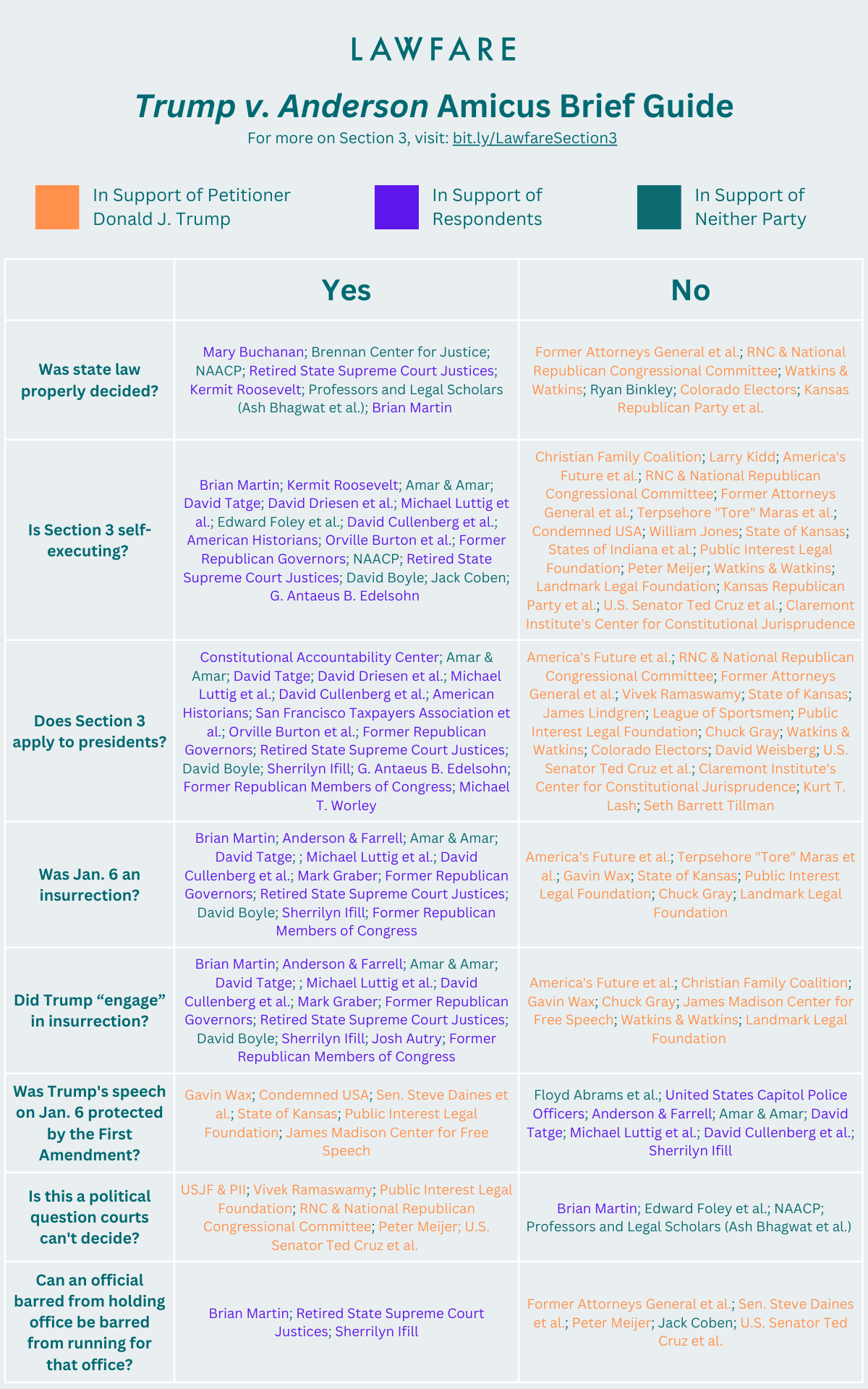Breaking Down the Amicus Briefs in Trump v. Anderson
Tomorrow, the Supreme Court will hear oral argument in Trump v. Anderson, the case challenging the Colorado Supreme Court’s ruling that disqualifies Trump from appearing on the 2024 presidential election primary ballot in that state. As we have discussed on multiple occasions, the case raises fraught political issues and multiple questions under both state and federal law, including, most prominently, the meaning of Section 3 of the 14th Amendment.
The provision disqualifies from certain offices those who, after taking an oath to support the Constitution in the process of ascending to any of a list of similar public offices, have since engaged in insurrection. In evaluating whether it bars Trump from the presidency, the Supreme Court will have to weigh a dizzying array of questions: Is Section 3 self-executing—that is, does it require an act of Congress or some other mechanism to enter it into force? Does it bar oath-breaking presidents from future office—as opposed to people who have held other public positions—and does it bar oath-breakers from the presidency? Was Jan. 6 an “insurrection,” and did Trump “engage” in it, within the meaning of Section 3?
The case has generated a tremendous amount of attention, including among non-parties professing to have a direct interest in the outcome. A total of 74 amicus briefs have been filed by individuals, organizations, current and former public officials, and academics. Of them, 32 are in support of the Petitioner, Donald J. Trump; 28 are in support of the Anderson Respondents; and 14 are in support of neither party.
For instance, former attorneys general Edwin Meese III, Michael Mukasey, and Bill Barr have joined a brief supporting Trump, while former federal appeals court judge J. Michael Luttig and former acting attorneys general Peter Keisler and Stuart Gerson have joined one supporting the respondents. Constitutional law professors Kurt Lash (for Trump) and Kermit Roosevelt (for respondents) have offered perspectives based on their expertise. Professors Seth Barrett Tillman and Josh Blackman—the leading champions of the view that Section 3 does not apply to presidents—have summarized their views for the court, while the Constitutional Accountability Center, among others, have tried to rebut their arguments. A group of First Amendment icons and scholars, including Floyd Abrams and Geoffrey Stone, have argued that disqualifying Trump for inciting insurrection does not violate First Amendment principles. Professors Carol Anderson and Ian Farrell have joined as amici for the respondents to argue against the equation of Jan. 6 with Black Lives Matter protests—a position that a Trump-supporting amicus brief by the Landmark Legal Foundation says would have to result if Jan. 6 were to be considered an insurrection. Constitutional scholars (and brothers) Akhil and Vikram Amar have characterized their brief as “supporting neither side,” though their arguments track respondents’ in many respects.
Below, we categorize where each of the amici land on core Section 3 interpretation questions, if their brief addressed it explicitly. We place them in the “Yes” or “No” column based on how their brief responds to questions that in theory lay in front of the Court in this appeal—even if the Court chooses not to address each one. And each amici is color-coded according to whether their brief was filed in support of Trump, in support of the Anderson Respondents, or in support of neither party.

Of course, this chart does not represent the full range of amici’s arguments. Some amici have devoted their briefs to issues not referenced in our chart. Cato Institute’s Ilya Somin, for instance, devotes his to arguing why he believes Section 3 disqualification does not require a prior criminal conviction and why the Colorado Supreme Court did not deny Trump due process—two issues that our chart doesn’t include. Other amici have raised different arguments—for instance, the Republican National Committee and National Republican Congressional Committee have argued that the Colorado Supreme Court’s disqualification of Trump from the primary ballot violates their party’s First Amendment associational rights.
